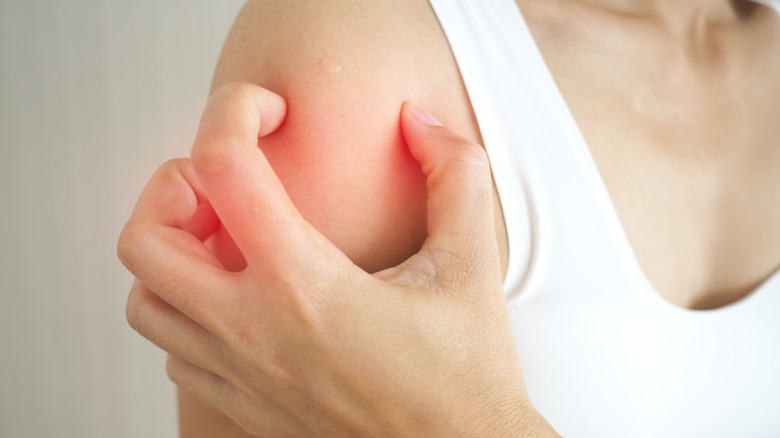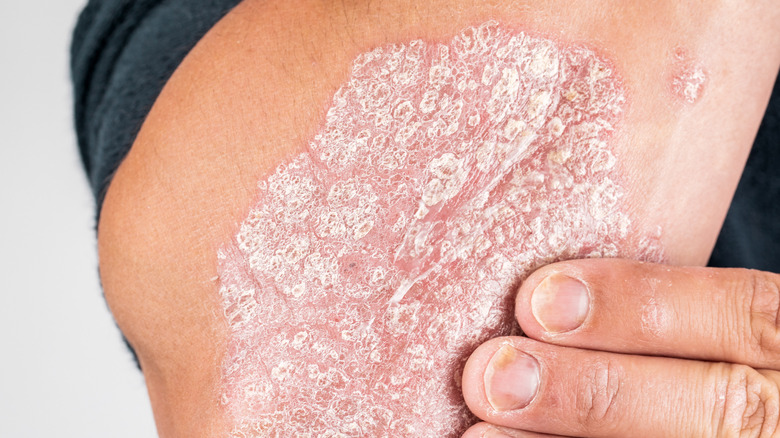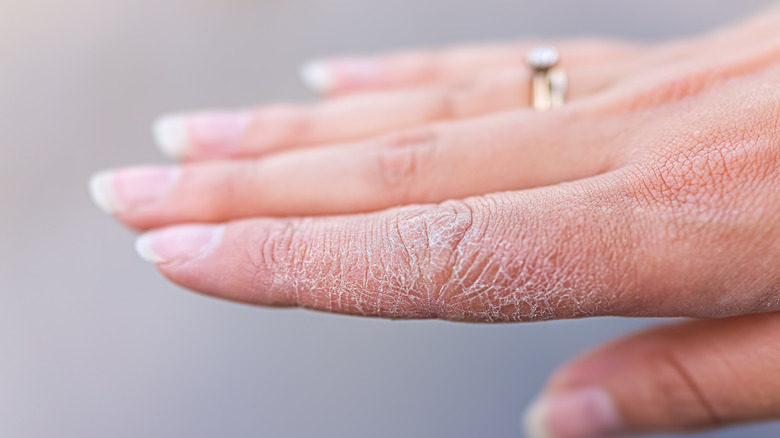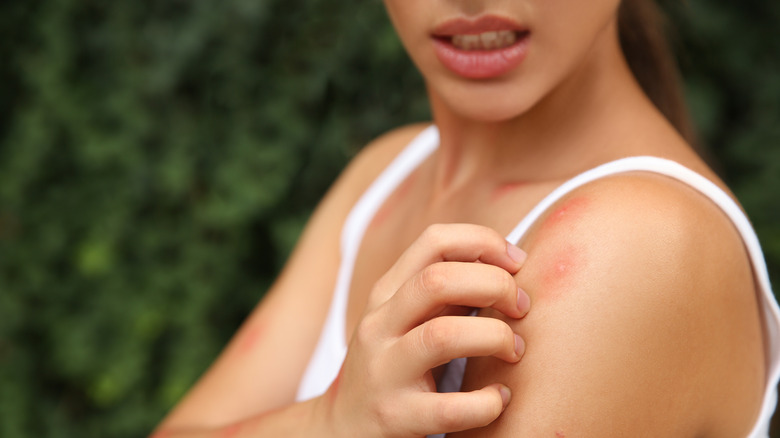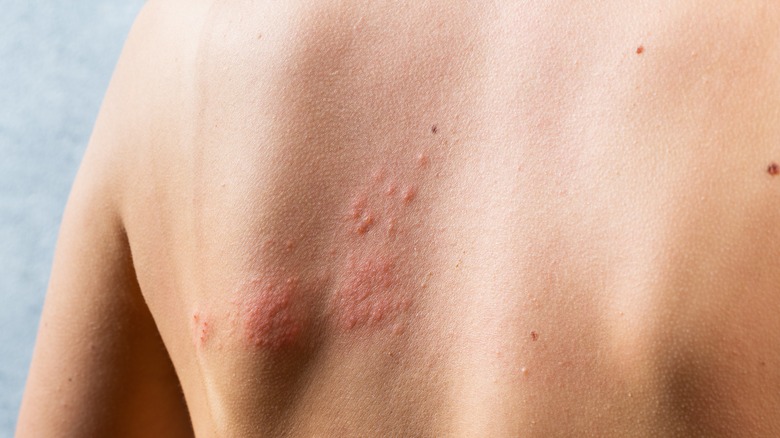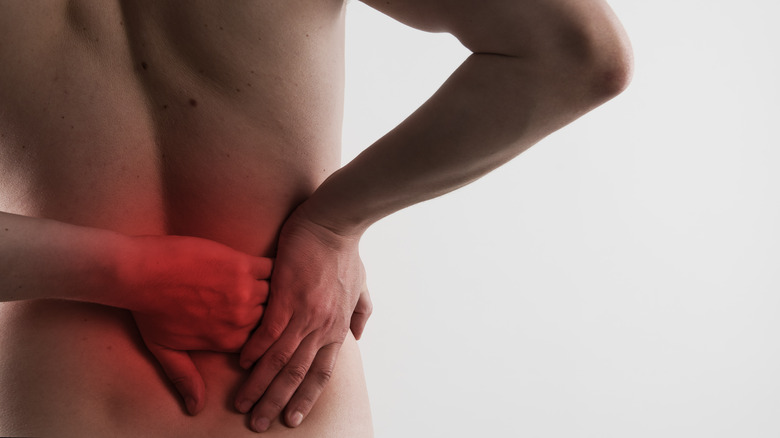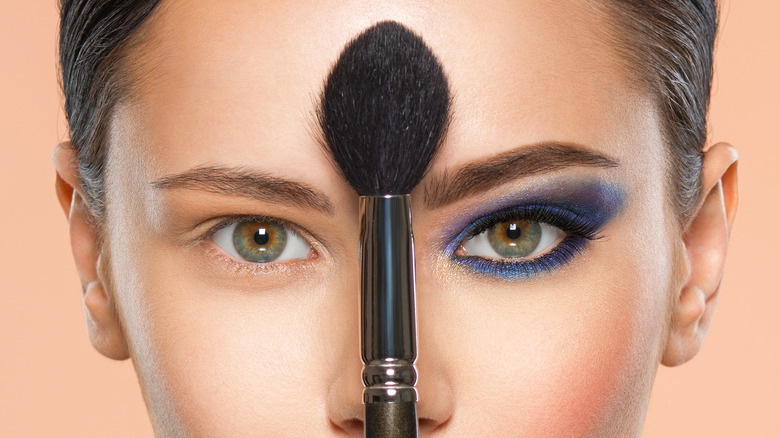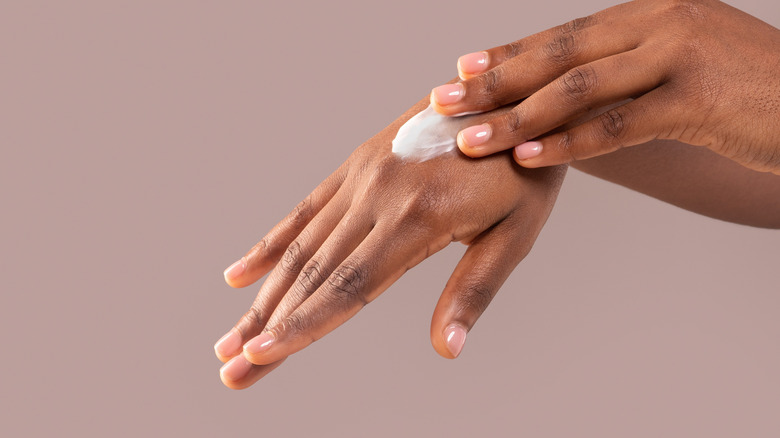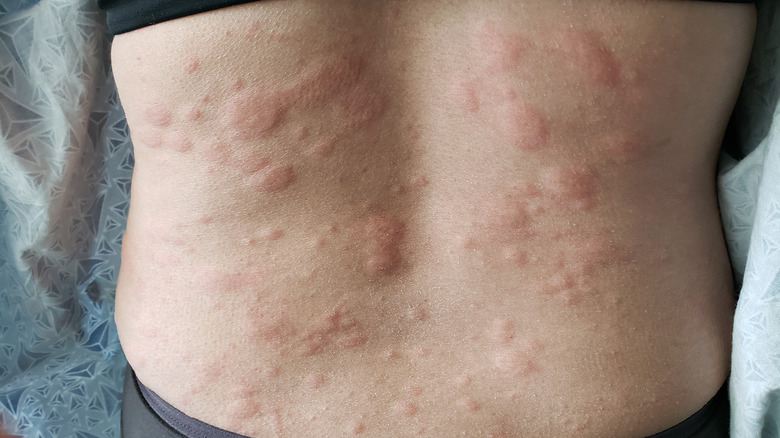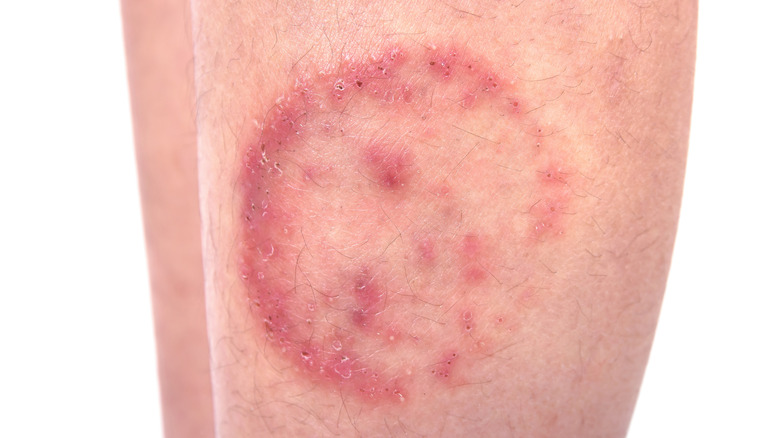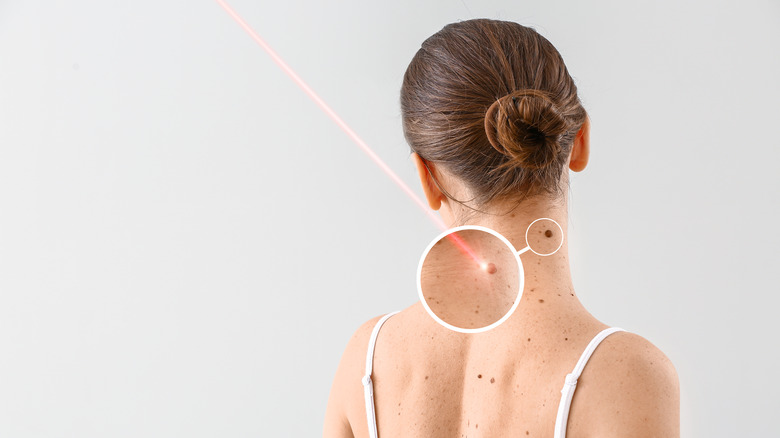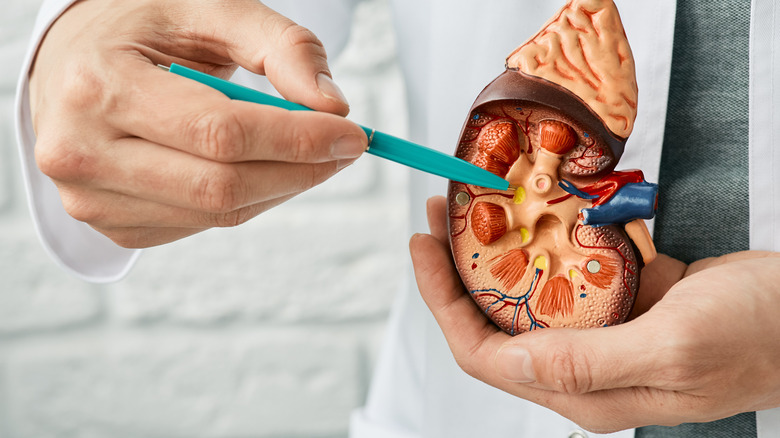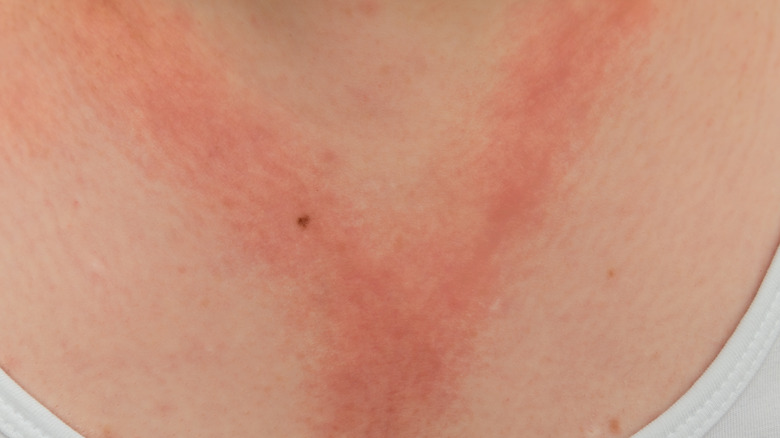14 Things That Could Be Causing Your Itchy Skin
Having itchy skin can be extremely frustrating, especially when you can't get to the bottom of what's triggering you to want to scratch. Turns out there are a lot of reasons why your skin could be itching, and if you're looking for sweet relief, it's probably best to narrow down the causes so you can apply the proper solution. Causes of itching can range from the not-so-serious to those requiring serious medical attention, according to Mayo Clinic, so the next time you find yourself regularly pawing at an itchy spot, it may be best to give it a second look.
Experts explain that itchy skin, which is medically known as pruritus, can often be triggered by dryness, and is actually more common in older adults due to the dryness of their skin. The appearance of the skin may vary according to the cause, but it has the potential to look anywhere from normal to rough and bumpy, according to experts at Mayo Clinic. While most cases of itching can be treated at home, a visit to your doctor may be in order if the itching has persisted for more than two weeks, is distracting you from your daily routines, or affects your whole body. If you want some insight on why you may be itching, continue reading to discover some potential causes.
Psoriasis
You may have seen some of the many commercials offering prescription medications to help alleviate this condition, but how many of us actually know what psoriasis really is? According to Healthline, psoriasis is a chronic autoimmune disorder that triggers your skin cells to rapidly build up, which then leads to scaly skin often accompanied by inflammation and redness. The site explains that on lighter skin, the scales can appear whitish and silver in color, and may appear in thick red patches on the skin. On darker skin, the scales may appear purple, brown, or grey.
There are different types of psoriasis, including plaque psoriasis, which is the most common, and pustular psoriasis among others. One of the primary symptoms of plaque psoriasis is itching and burning around the patches of skin. In fact, almost 90% of people who have psoriasis say that they experience itching, and that it is "the most annoying symptom of the condition" (via Healthline). To help calm the itch, experts recommend applying a thick cream to protect the skin, using itch relieving products such as calamine or hydrocortisone, or taking antihistamines.
Eczema
Eczema is another chronic skin condition that can lead to some uncomfortable itchiness. Also known as atopic dermatitis, eczema is a long-lasting condition that is characterized by periodic flare-ups, according to Mayo Clinic. Symptoms of eczema may vary widely, but primary symptoms include itching — which can become severe — dry skin, skin that is scaly or cracked, and discolored patches, among others.
While it's probably easier said than done, experts caution against scratching your eczema in order to avoid making it worse. WebMD says that while it may bring some relief, aggressively scratching your eczema can actually lead to broken skin and bleeding, making the condition much worse. Instead, use a cold compress in the form of a wet washcloth or an ice pack that you can apply directly to the itchy area. This will help numb the area and prevent itchiness. Another technique is applying oils such as extra virgin coconut oil to the affected area. Coconut oil in particular is known to help fight inflammation.
Your medication
If you recently started taking new meds and suddenly find yourself itching with no end in sight, there may be a connection between the two things. WebMD confirms that yes, your medication could in fact be triggering your itchiness, and certain medications can even cause you to itch without any outward signs of rash or irritation. The experts at DermNet NZ explain that drug-induced pruritus, which is the medical term for this condition, can happen anywhere between hours and weeks of starting a new medication. It can fall into the category of an acute case, meaning it lasts less than six weeks, or a chronic case, meaning it lasts longer than six weeks. Itching may occur in a single location, or may be widespread, and may even persist for months after you have ceased taking the medication.
This type of reaction is seen more frequently in older patients, as well as those who are taking more than one medication. Furthermore, genetics and dry skin may also play a role in its prevalence. Classes of drugs that have been known to cause itching include opioids, high blood pressure medications called ACE inhibitors, diuretics, estrogen, and some over-the-counter pain relievers, according to both WebMD and DermNet NZ.
Bug bites
Bug bites are an annoying, albeit somewhat inevitable part of life. It's quite difficult to avoid bugs if you spend any amount of time outdoors (via Centers for Disease Control and Prevention), and despite protective sprays and nets and clothing, sometimes you still get bitten by a rogue insect (via American Academy of Dermatology). One blood-sucking insect that leaves you itching is the tiny but mighty mosquito. According to Healthline, mosquito bites affect many people each year, and trigger a range of reactions. The most common reaction is an itchy, raised bump, and this happens because when the mosquito pierces your skin to draw blood, it inserts saliva into your skin which causes an auto-immune response. After this, the body releases histamines, which promote the formation of white blood cells, and cause itching.
And yes, it's not just your imagination — scratching bug bites can actually lead to more itchiness. Scratching can lead to more inflammation, which causes the bite to itch even more. Other insects whose bites can lead to itching include fire ants, fleas, bed bugs, spiders, chiggers, and more, according to Healthline. In order to help heal the itchiness, experts suggest avoiding scratching and instead applying a cold compress, taking over-the-counter antihistamines, or applying aloe vera.
Shingles
If you've had chickenpox before, then you may already be familiar with the virus that can cause shingles, varicella zoster. According to WebMD, while chickenpox and shingles are two separate conditions, they come from the same virus that produces a variety of undesirable side effects, one of which is — you guessed it — itching. After you have chickenpox, the virus doesn't actually leave your body, but lays dormant in your tissues. In some circumstances, the dormant virus can get activated and cause a second round of symptoms, which is known as shingles. Things that can trigger shingles include stress, a weakened immune system, older age, or serious physical injury.
Healthline explains that the first symptoms of shingles include pain and burning, which is usually isolated to one side of your body. After this, a red rash is likely to follow, which can range in color from pink to dark purple depending on your skin color. In addition to itching, the rash can also tingle and burn, and will last anywhere from three to five weeks. Treatment might consist of anti-viral medications, anti-inflammatory drugs to reduce pain and swelling, and anti-histamines and creams to help stop itching.
Nerve damage
Believe it or not, it is actually possible to experience itching from a pinched nerve. Verywell Health explains that this type of itching, called neurological itching or neuropathic itching, is caused by nerve damage and can be chronic. This kind of itching originates in either the central nervous or peripheral nervous system, meaning it can result either from nerve damage in the brain or spinal chord, or from nerve damage elsewhere in the body. Along with itching, sufferers might experience pain, as the same neurological pathways that cause pain are also associated with the itching.
Symptoms of neurological itching include "prickly, burning, or crawling" sensations that may occur simultaneously with feelings of numbness, cold, and electric-like shocks. If you're experiencing this type of itching and feel the urge to scratch, hold off — it is unlikely to cause relief. Unfortunately, neurological itching doesn't respond to the same treatments as other kinds, and will require alternative treatments such as topical capsaicin, Botox injections, or nerve blocks.
Your makeup
While makeup has come a long way since the days when it was laced with arsenic and lead, there are still some ingredients in modern makeup that may leave you scratching your head — literally. MedicineNet reports that the majority of adverse reactions people experience after applying makeup are irritations, not allergies. Most irritations will occur after a single application of the specific cosmetic, so you won't need much time to find out whether your skin is reacting badly. An allergy, however, may develop over time, so it might be a while before you figure out whether your skin is allergic to specific ingredients in your makeup.
Some triggering ingredients you may find hiding out in your makeup bag include "perfumes, emulsifiers, sunscreens, pigments, metals, resins, and preservatives, as well as a variety of inert materials," according to MedicineNet. Essential oils or other botanicals may also be culprits. Typical symptoms of irritation or an allergic reaction to makeup include rashes that scale, flake, or provoke dry skin, as well as swelling and itching. If you are unsure about what's causing your irritation, it may be best to visit a dermatologist to get a more specific diagnosis. You can also perform a "patch test" on your forearm to figure out what item is bothering you.
Your clothes
That wool sweater your favorite aunt made for your birthday that you just can't seem to part with? Yeah — it may be the reason behind your constant scratching. WebMD defines any type of allergic reaction to your clothes as "textile dermatitis," which is essentially when your skin reacts negatively to the fibers, dyes, resins, and chemicals used to make your clothing. While any type of clothing can lead to this reaction, clothing made from materials such as "polyester, rayon, nylon, spandex, or rubber" are more likely to cause adverse reactions, since they are synthetic. Because these clothes are not as breathable as cotton, they may cling to your skin and lead to increased sweating. In addition to their high cling factor, chemicals such as formaldehyde, dyes, and glues can cause allergic reactions and lead to irritation and itchiness.
Symptoms of textile dermatitis include red skin, scaly skin, and itchiness. Depending on your body's physiology, it could take hours to weeks for you to develop symptoms. When they do appear, symptoms usually develop in the folds of your skin including your underarms, behind your knees, the crooks of your arms, etc. If you suspect you're having an allergic reaction to your clothes, experts suggest to stop wearing the clothes immediately and make the switch to more natural, loose-fitting fabrics.
Dry skin
Sometimes the source of your itchy skin isn't as out of left field as you may want to believe. If you find yourself pawing at your skin in desperation and realize you forgot to moisturize, your solution may be close at hand. While in some cases dry skin may just be a simple case of neglect, in others it may be the result of old age, climate, or an underlying health condition according to the Cleveland Clinic. The site explains that the medical term for dry skin is "xerosis," and it simply means that your skin lacks enough moisture. Itchiness is a common side effect of dry skin, as well as flakiness, redness, and cracking.
As mentioned, age is a contributing factor to a decrease of moisture in the skin. This is because as you get older, moisture producing glands dry up, the skin thins, and overall elasticity decreases. Drier climates can also contribute to dry, itchy skin, as there is less humidity and moisture in the air. The primary treatment of dry skin is pretty straightforward: moisturize. Moisturizers such as lotions, oils, ointments, and creams can help to recreate the natural skin barrier and soften your skin.
Hives
Anyone who has experienced hives knows that they are no walk in the park. These itchy, swollen marks may sting or be painful, according to Healthline, and they usually come as a result of medication, food, or an environmental irritant. However, hives are typically short-lived. If they were caused by an allergic reaction, symptoms can be eliminated by taking antihistamines, which can help neutralize the histamines that your body produces to attack perceived foreign invaders — unfortunately, these histamines can also cause uncomfortable reactions such as itching, swelling, and irritation.
In addition to being triggered by allergic reactions, hives can also come on as a result of "stress, tight clothes, exercise, illnesses, or infections," as well as from extreme hot or cold temperatures. Hives appear on the skin as welts, are typically small in size, and can either be round, shaped like a ring, or have no particular shape. They may cluster in certain areas of the body. To get relief from hives, Healthline suggests taking an antihistamine, avoiding scratching, and taking a lukewarm or cool bath with oats.
Ringworm
Despite its name, ringworm does not in fact involve a worm of any kind (big sigh of relief). According to the Mayo Clinic, ringworm is a fungal infection that appears as a circular rash on the skin. This fungus belongs to the same family as jock itch and athlete's foot, and can be transmitted via skin-to-skin contact. Symptoms of ringworm include a large scaly circle on the skin that itches. The area inside the circle may not be affected, or can include scaly areas with discolored bumps.
According to Healthline, ringworm can be caused by at least 40 different types of fungus that can be found living on skin or on other damp surfaces. Not only can it be spread from human to human, it can also be transmitted to humans from animals, objects, or soil. Factors that increase your chances of coming into contact with ringworm include living in damp environments, being in close contact with animals, doing contact sports like wrestling, or having diabetes or a weakened immune system. Treatment for ringworm includes direct application of antifungal medication, or perhaps prescription-strength oral medication depending on the severity.
Skin cancer
While there's a pretty good chance that the cause behind your itching is nothing to get too worked up about, there is a possibility that something more serious could be behind it. While it's best not to panic and immediately assume the worst, Healthline points out that if you find a mole on your skin that itches and changes in shape, there's a chance it could be skin cancer. While skin cancer is typically asymptomatic, itchiness can occasionally occur in certain types of cancer, such as with basal cell carcinomas or melanoma. In basal skin cell cancer you may see a raised, reddish patch of itchy skin, and with melanoma you may experience "itchy dark spots or moles." These irritations are usually persistent and won't heal, which is your first sign to go to the doctor to have them evaluated.
Another type of cancer that may cause a rash accompanied by itchiness is mycosis fungoides, a type of blood cancer that can cause a red, scaly rash on the skin that itches, peels, and hurts. It's important to take steps to prevent skin cancer by making sure to apply at least 30 SPF sunscreen to all exposed parts of your skin, wearing sun-protective clothing, and avoiding the use of tanning beds.
Kidney disease
Kidney disease could be another more serious reason behind itchy skin. According to the American Academy of Dermatology, if you are diagnosed with kidney disease, while you may not immediately notice the symptoms on your skin, certain symptoms will develop as the disease progresses. These include very dry skin, to the point where it begins to scale, flake, and crack, accompanied by extraordinarily itchy skin. Itchy skin that results from kidney disease can be anywhere from mildly irritating to significantly problematic, and the itch may persist at all times.
DermNet NZ explains that itchy skin as a result of kidney disease affects about a third of patients on dialysis. It is referred to as uraemic pruritus, and experts believe it happens as a result of dry skin, a reduction in sweating, accumulated toxins in the body, inflammation, and abnormal concentrations of aluminum and magnesium. The itchy feeling primarily affects the back, but can also be present on the "arms, head, and abdomen." To help relieve itching, the site suggests making sure you are optimizing your dialysis treatments, using non-soap-based cleansers, and avoiding scratching.
Nickel allergy
If you've ever purchased jewelry and been left with a seemingly unexplainable itchy rash, you may have a nickel allergy. According to the Cleveland Clinic, nickel is a metal present in a variety of commonly used objects including costume jewelry, glasses, buttons, coins, keys, metal tools, and utensils. If you come into contact with nickel and it spurs an allergic reaction, you may experience redness or skin that itches, burns, or cracks, among other symptoms. The sweat from your skin actually leaches the nickel from the metal, which is then absorbed by the skin. For those who get piercings, the open flesh is even more likely to leach nickel, increasing the likelihood of an allergic reaction. It may take as long as 72 hours for an allergic reaction to take place, but there are some cases where the symptoms are immediate and result in a "hive-like reaction" at the site of exposure.
If you suspect you have a nickel allergy, you can visit your doctor, who will perform a patch test and give you a diagnosis. If you do have a nickel allergy, the only solution is to avoid nickel all together. To help heal symptoms you can take antihistamines, or apply lotions, creams, or corticosteroids to reduce inflammation.
